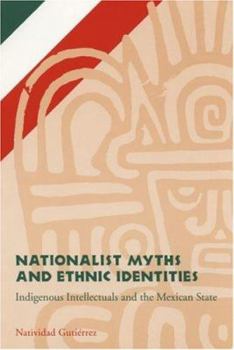Nationalists Myths and Ethnic Identities: Indigenous Intellectuals and the Mexican State
Select Format
Select Condition 
Book Overview
This timely study examines the processes by which modern states are created within multiethnic societies. How are national identities forged from countries made up of peoples with different and often conflicting cultures, languages, and histories? How successful is this process? What is lost and gained from the emergence of national identities?Natividad Gutierrez examines the development of the modern Mexican state to address these difficult questions. She describes how Mexican national identity has been and is being created and evaluates the effectiveness of that process of state-building. Her investigation is distinguished by a critical consideration of cross-cultural theories of nationalism and the illuminating use of a broad range of data from Mexican culture and history, including interviews with contemporary indigenous intellectuals and students, an analysis of public-school textbooks, and information gathered from indigenous organizations. Gutierrez argues that the modern Mexican state is buttressed by pervasive nationalist myths of foundation, descent, and heroism. These myths expressed and reinforced through the manipulation of symbols, public education, and political discourse downplay separate ethnic identities and work together to articulate an overriding nationalist ideology.The ideology girding the Mexican state has not been entirely successful, however. This study reveals that indigenous intellectuals and students are troubled by the relationship between their nationalist and ethnic identities and are increasingly questioning official policies of integration."
Format:Paperback
Language:English
ISBN:080327078X
ISBN13:9780803270787
Release Date:January 1999
Publisher:University of Nebraska Press
Length:242 Pages
Weight:0.80 lbs.
Dimensions:0.6" x 6.0" x 9.0"
Customer Reviews
1 rating
Mestizo vs. Indigenous in the building of a nation
Published by Thriftbooks.com User , 23 years ago
A quick glance may lead us to conclude that this is just another book on the never-ending frictions and conflictive relations between the Mexican State and sundry ethnic groups that dwell within its territory. A more profound look will lead us to discover not only new issues about the said subject, as a result of the numerous works dealing with the challenges posed by ethnicities living within the state-nations, but also new theoretical and methodological outputs that may helps us disentangle the meaning of such processes.The main concern of Natividad Gutiérrez is to analyze the processes of creation of the national identity in a multiethnic society. Thus, the book is divided in two parts. The first is dedicated to analyze the institutional mechanisms by which the state uses the past as a way to facilitate the integration of an ethnically diverse society. The second examines the articulated response of educated members of indigenous groups to an imposed national identity.In the light of the highly polarized academic debate between "historic-culturalists" and "modernists" represented by Anthony D. Smith and Ernest Gellner respectively, on whether today's nations have an ethnic and historic origin or they are just the product of modern objective conditions, namely, revolutions, state, industrialization, integrationist policies and mass education, the author suggests a second level of analysis. If from the "modernist" perspective the enormous burden of the state institutions and instruments may be demonstrated (i.e. educational system, mass media, textbooks, among others) in the transfer, spread and instilment of nationalism, it is not less true that such perspective tells but little about the use and persistency of the historical past and the cultural uniqueness. In order to relief such absence, the author makes use of the perspective hold by the "historic-culturalists" who argue that the subjective elements of the cultural past, based on religion, ethnicity, symbolism or mythology, constitute the ground upon which to understand the ideological content of each nationalism, for nowadays nations are recognized by their unique cultural background, exclusive and authentic. To possess an "authentic culture", no less renovated, reconstituted and rebuilt, plays a decisive function, for it allows the state-nations to conceive themselves a unique aggregate that holds a territory, a history and a culture, unique as well. Therefore, both the "civic" nationalism model and the "territorial" one require to limit and search for their "myths of origin and their shared history", which are taken from myths and symbols of preexisting ethnic groups or recombine them into new cultural matrices. The collection and analysis of the views and perceptions of the indigenous peoples regarding the nationalist discourse, constitutes the third level of analysis. Gutiérrez uses the opinions granted by the study of a minority of Indian people who have benefited from a higher level






